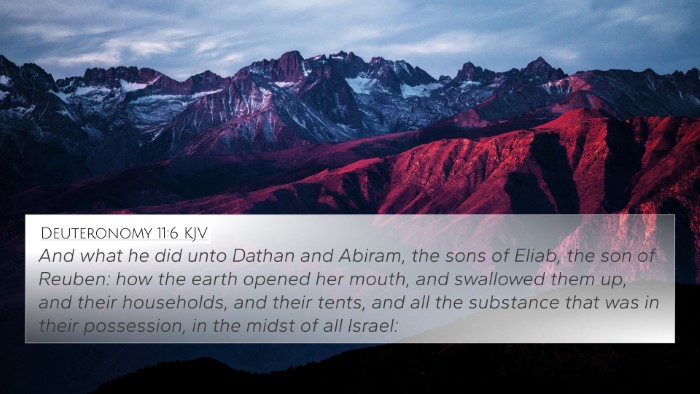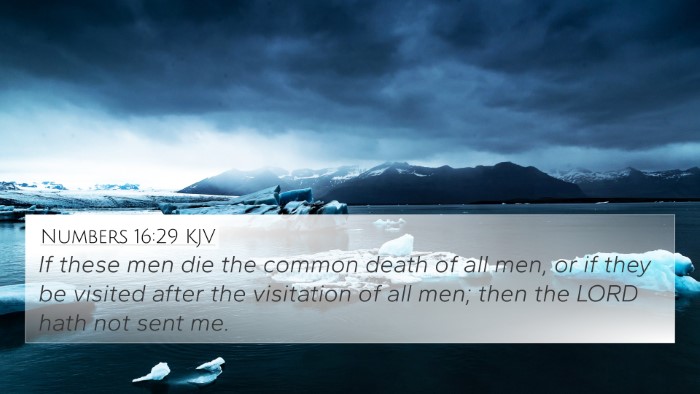Psalms 106:17 - Summary and Explanation
Psalms 106:17 states, "The earth opened up and swallowed Dathan; it buried the company of Abiram." This verse serves as a crucial reminder of God's judgment and the consequences that follow rebellion against divine authority.
Contextual Background
The context of Psalms 106 reflects on Israel's history and their repeated instances of rebellion against God. This specific incident relates to the rebellion of Korah, Dathan, and Abiram as recorded in Numbers 16. God’s intervention through dramatic means illustrates His justice and the severe ramifications of leading others astray.
Commentary Insights
Matthew Henry Commentary
Henry highlights the seriousness of Dathan and Abiram's rebellion against Moses and God's appointed leadership. Their actions were characterized by their refusal to recognize the authority of God’s chosen leaders, which ultimately led to their destruction. Such events serve as admonitions against pride and disobedience.
Albert Barnes Commentary
Barnes emphasizes that the punishment of Dathan and Abiram was both literal and symbolic. The earth opening up signifies not only a physical consequence but also the spiritual reality of divine judgment that befalls those who oppose God’s will. His commentary draws parallels with the ultimate fate that awaits those who persist in defiance against God.
Adam Clarke Commentary
Clarke discusses the nature of divine retribution visible in this account, where the very ground conceives the guilty, demonstrating God's active role in ensuring justice. Clarke illustrates the theological truth that God will defend His sanctity and purify His people from corruption, offering an understanding of God’s holiness and the need for alignment with His standards.
Connections Between Bible Verses
Psalms 106:17 can be interconnected with several other scriptures that reflect on God’s judgment and the consequences of rebellion. Here are some pertinent cross-references:
- Numbers 16:30-33 - The account of the earth swallowing Dathan and Abiram as a result of their rebellion.
- Jude 1:11 - Reference to the way of Cain, Balaam, and Korah, which indicates God's judgment on rebellion.
- Hebrews 10:31 - "It is a fearful thing to fall into the hands of the living God," reinforcing the message of divine judgment.
- Proverbs 16:18 - "Pride goes before destruction, and a haughty spirit before a fall," emphasizing the dangers of pride.
- 1 Corinthians 10:10-11 - Paul reminds the Corinthians about the consequences faced by Israel during their rebellion, encouraging faithfulness.
- Psalm 7:11 - God is described as a righteous judge, signifying His authority over judgment.
- Ecclesiastes 8:11 - "Because the sentence against an evil deed is not executed speedily, the hearts of the children of man are fully set to do evil," showcasing the nature of delayed judgment.
- Isaiah 5:14 - Conveys the seriousness of God’s wrath against rebellion and unfaithfulness to His covenant.
Thematic Connections and Lessons
From a thematic perspective, Psalms 106:17 intertwines with larger Biblical narratives concerning authority, the holiness of God, and the severity of judgment. The rebellion of Korah stands as a cautionary tale of how dissent against God’s divine order can lead to catastrophic results. Here are several reflections:
- The call for reverence: The reaction of the earth highlights the importance of recognizing God’s holiness and authority.
- The danger of leading others into rebellion: Dathan and Abiram led others with them, emphasizing the impact of one’s actions on a collective community.
- God's sovereignty: The event is a stark reminder of God’s power in judgment and His ability to preserve His people from corruption.
- Lessons on humility: Humility before God and His appointed leaders can prevent tragic outcomes that stem from pride and rebellion.
- The importance of obedience: Aligning oneself with God’s commands and those He has placed in authority is crucial for the well-being of the community.
Practical Applications
Understanding Psalms 106:17 goes beyond a historical narrative; it provides profound insights for contemporary believers:
- Self-reflection: Assessing whether one operates in humility and obedience to God’s guidance.
- Community awareness: Recognizing the influence one has over others and ensuring that it brings forth God’s glory rather than division.
- Seeking wisdom: Engaging with scriptural texts and commentaries can aid in better understanding God’s will and judgments.
- Prayer for discernment: Seeking God in prayer about leadership and the acceptance of His authority in one’s life.
Conclusion
Psalms 106:17 serves as a chilling reminder of the consequences of rebellion against God and the importance of revering His commandments and appointed leaders. The various commentaries provide rich insights that emphasize God’s justice and authority, encouraging believers to study biblical connections and apply its lessons in their lives. By engaging with cross-referenced scriptures, individuals can gain a comprehensive understanding of God’s character and His covenant with humanity.





